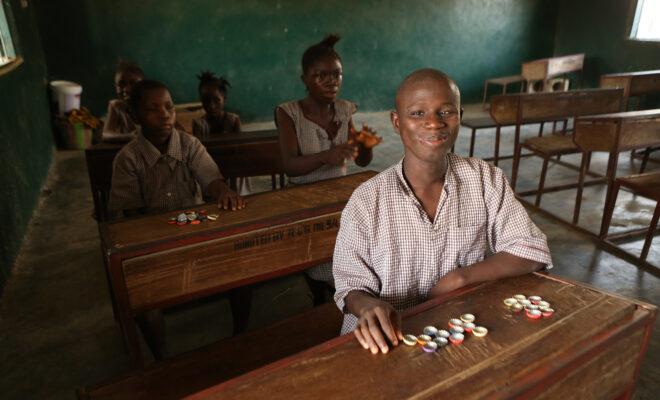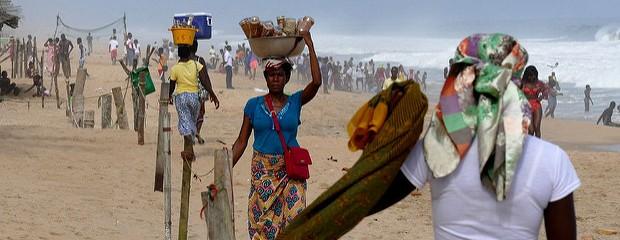I wasn’t left behind, but most learners with disabilities still are

Most students with disabilities do not get a good quality education, but small changes can make a big difference.

A student in a Sightsavers-supported school for the blind in Sierra Leone. Credit: Peter Nicholls/Sightsavers 2015
Inclusive education is very close to my heart. When I first went to school in Ghana, I was able to read and write, but by the time I turned 10, I needed spectacles to see. By 14, I was no longer able to read most printed books even with glasses.
I nonetheless stayed in mainstream school until I was 17. Some teachers were supportive. They would read out what they wrote on the board so I could follow or organise after-school classes for me. But they were the exception. At the time, Ghana had no policies to cater to students with low vision and, without specialised support, I struggled.
It wasn’t until I went to a residential school for blind people that I was taught to type and use braille. I was introduced to audio cassettes and met other blind students. Thanks to this, I acquired valuable skills and knowledge which enabled me to go to college and enter the world of work. Without that education I would not be where I am today.
Unfortunately, my experience was exceptional. As a recent Sightsavers background paper to UNESCO’s 2020 Global Education Monitoring Report shows, the vast majority of children with visual impairments in sub-Saharan Africa do not receive a good quality education. Census data from 13 countries indicates that only 56.8% of boys and 60.1% of girls with visual impairments aged 12 are literate. Even more worryingly, large numbers of these children do not go to school at all; 30% of all students with visual impairments aged 12 have never even been enrolled.
This accounts for a lot of children. Around one third of the world’s 419,000 blind young people live in sub-Saharan Africa.
Under-investment in education systems and specialist support – along with negative social attitudes and practices – mean that children with visual impairments in Africa are often denied the chance to learn like their peers. This can have huge effects on their long-term quality of life, limiting their employment prospects and trapping them in poverty.
The picture is similar across the world. Before COVID-19, less than 50% of school-age children with disabilities in low- and middle-income countries were in education. Since school closures amid the pandemic, most learners with disabilities have been left behind or totally excluded from alternative learning processes such as online and distance learning.
Making schools inclusive
None of this is inevitable. There are measures that can ensure children with disabilities have proper educational support.
For instance, schools can make sure that all learners have access to the right equipment, technology and learning materials in accessible formats. They can train and support students to use equipment effectively, confidently and safely. Teachers can similarly be provided with continuous training on how to support children with disabilities.
In schools, even relatively simple adaptations can make a huge difference – for instance by placing a child with low vision near the front of a classroom or painting stripes on the edges of steps. Similarly, using audio description and allowing children who are blind to touch teaching aids can help significantly. For students with visual impairments, eye health can also be tied into school services to ensure children with vision difficulties are quickly identified and referred for assessment.
During school closures, ensuring everyone can continue their education means making distance learning more accessible and inclusive. Teachers can be trained to support children with visual impairments and other disabilities to study from home like their peers and not be left behind.
Change from below
To achieve all this, education ministries – with the support of civil society and the international development community – must call for increased and sustained investment in inclusive education. Inclusive education that, rather than being imposed from above, emerges from below and thus draws on the passion, creativity and expertise of all those involved, including people with disabilities and their representative organisations.
This should be combined with research-driven, evidence-based educational reform and programmes that recognise the diverse needs of children with visual impairments in particular and children with disabilities in general. Data should be collected on what access is available and what the outcomes are for students: are they on the same level as their peers and receiving the same quality of education?
Inclusion is not a destination but a process that must be constantly worked at and improved upon. Like I did, all children need the opportunity to realise their potential and we have the tools and solutions available to us to make this a reality.





